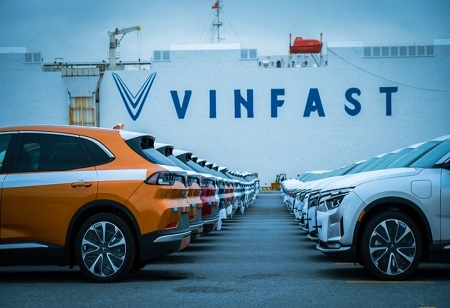
VinFast Advances Asia Expansion Amid EV Market Slowdown

 VinFast Auto, the Vietnamese electric car manufacturer, is accelerating its expansion across Asia despite a global slowdown in electric vehicle (EV) demand and a lackluster beginning in the US market. Founder Pham Nhat Vuong remains undeterred, as VinFast plans to open its factory in India in the first half of next year, six months ahead of schedule. Additionally, construction of a plant in Indonesia is set to commence within the next two months, Vuong stated during an interview at the Hanoi headquarters of parent company Vingroup.
VinFast Auto, the Vietnamese electric car manufacturer, is accelerating its expansion across Asia despite a global slowdown in electric vehicle (EV) demand and a lackluster beginning in the US market. Founder Pham Nhat Vuong remains undeterred, as VinFast plans to open its factory in India in the first half of next year, six months ahead of schedule. Additionally, construction of a plant in Indonesia is set to commence within the next two months, Vuong stated during an interview at the Hanoi headquarters of parent company Vingroup.
The ambitious growth plans come even as VinFast struggles to gain a foothold in the highly competitive EV market. The automaker delivered just 9,689 cars in the first three months of the year, well off the pace to meet its annual 100,000 target. It sold 34,855 vehicles in 2023, most of which went to related parties. And after a spectacular US market debut in August, when the stock soared more than 700 percent in just two weeks, the shares have crashed back to earth, down more than 90 percent from their peak.
However, Vuong brushed aside concerns about slowing global demand for EVs, which has roiled more established rivals from Tesla to Volkswagen. “I’m not worried about electric vehicle sales”, he said in the interview. In January, VinFast signed an agreement with the Indian state of Tamil Nadu to invest up to US$2 billion in the country, aiming to enter one of the world's largest auto markets. Construction of the plant began in February, starting with an initial investment of US$500 million.
Vuong stated that production at the Indonesian site is now planned to start by the end of 2025, ahead of the original 2026 schedule. Both factories will initially have a production capacity of 50,000 vehicles each, with the potential to increase to 300,000 annually, depending on market demand. VinFast, which started deliveries in the US last year, is encountering challenges in becoming a profitable global brand. Chinese competitors are ramping up exports of increasingly affordable EVs, and Tesla has reduced prices in response to declining interest.
For now, the company remains on track to start building cars at its North Carolina factory – where construction began in July last year, Vuong said. Production at the plant, which is expected to have an initial capacity to make 150,000 vehicles a year, is set to start in 2025, the company said last year. However, Vuong said it is weighing investor concerns about the factory’s costs amid high interest rates and whether to delay the opening against the benefit of sticking to the current timetable to meet growing US demand for EVs.
He added that there are no plans to reduce the factory's production capacity or scale down its footprint. According to a company filing, VinFast had a net debt of approximately US$2.9 billion at the end of March, with cash and cash equivalents totaling US$123.3 million. The company estimates that capital expenditures for 2024 will range from US$1 billion to US$1.5 billion, funded through a combination of debt and equity financing.

